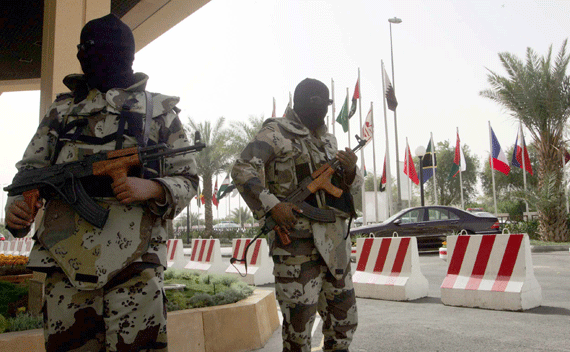Saudi Counter-Terror Law Addresses Al-Qaeda Threat

This is a guest post by Salman Al-Rashid. Salman holds a B.A. in History from Stanford University and is an M.A. Candidate in Security Studies at Georgetown University. He is originally from Riyadh, Saudi Arabia.
Recent reports indicate that Saudi leadership is drafting a robust anti-terror law. Given Ali Abdullah Saleh’s fall from grace in Yemen, the kingdom might face a resurgence of terrorist activity within its borders. The law is meant to address this threat.
Some analysts, however, argue that the statute is targeted toward internal political dissenters. The law, known as the Draft Penal Law for Terrorism Crimes and Financing Terrorism, sanctions long detentions without recourse to trial and denies citizens their right to criticize rulers. While the statute does not apply only to suspected acts of terrorism, it’s important to remember that it remains a draft; what the final law looks like remains to be seen.
Saudi Arabia’s terrorist rehabilitation program provides clues for how the new law could be used. Kingdom and foreign officials have lauded this effort that, according to a Saudi embassy report, aims to “undermine any justifications for extremism and terrorism on an intellectual level.”
But negative perceptions of the program allude to the ways the new law could tighten the grip on domestic opposition. In a 2008 article, Christopher Wilcke argues that the program led to the involuntary detention of many individuals not involved in terrorism and that it embodies the flaws in a Saudi criminal justice system that respects neither the “principles of fairness” nor “the rule of law.”
Amnesty International (AI) warns that if passed the new law will entrench the practice of lengthy detentions. It claims that since the law expands the definition of terrorism to include acts that threaten national unity, it will “in effect criminalise legitimate dissent.” Because political upheaval in the region is recalibrating regimes’ perception of their own safety, AI and others have developed a convincing narrative that the law reveals Saudi Arabia’s counter-revolutionary motives.
This narrative assumes that the kingdom’s rulers are worried about domestic unrest. But the kingdom has remained relatively calm during chaotic times. Rather, regional developments give the Saudis genuine cause to fear potential terrorist attacks, and the final draft of the law likely will reflect this threat.
The June 3 attack against Saleh’s presidential palace that forced him to seek emergency medical treatment in Saudi Arabia may have satisfied many Yemenis’ demand that Saleh step down; at the same time, it deconstructed a perennial counter-terror arrangement in the Arabian Peninsula. It deprived Saudi Arabia of a reliable counter-terror partner that reigned in on Al-Qaeda militants seeking to wreak havoc both in Yemen and the kingdom.
The new law will address the real threats to Saudi security that Al-Qaeda operatives in the now largely ungoverned swathes of Yemeni territory pose to Saudi citizens and infrastructure. According to Reuters, Saudi officials describe the law as a means to rearm against an Al-Qaeda that has solidified itself in Yemen amidst the political turmoil and economic despair gripping that country.
The timely law could enhance the kingdom’s counter-terrorism capabilities and continue its success in preserving domestic security. According to an earlier Saudi embassy report, Saudi security forces have foiled “more than 180 terrorist plots within the Kingdom” and “[dismantled] Al-Qaeda’s operations.” Authorities have effectively engaged community members, gathered intelligence, and targeted the financial sources for terrorists, and the new law will ensure this success in an increasingly dangerous environment.
The argument that Saudi Arabia’s history of success against terrorists within its borders means the new law addresses non-terrorist threats to the regime does not carry much weight. This line of thinking assumes that the terror threat in the Arabian Peninsula remains at a constant level, when in fact it has increased significantly in the wake of worrisome developments in Yemen.
Counter-terrorist energies within the kingdom could cause some discomfort to those in Washington who romanticize the Arab Spring, suggest regime change looms in every Arab country, and therefore see this law as a counterbalance to democratization. But they will reassure those who support continued drone strikes against Al-Qaeda strongholds in Yemen and continued committment to the war on terror.
By strengthening counter-terror law, Saudi rulers are safeguarding Saudi and American interests and protecting a fragile global economy. It’s possible that the kingdom’s rulers could exploit the new statute to combat domestic protest in the future. But as of now, it’s more sensible (and fair to Saudi Arabia) to characterize the law as a response to a legitimate threat emanating from Yemen rather than a minor one emanating from within.
 Online Store
Online Store